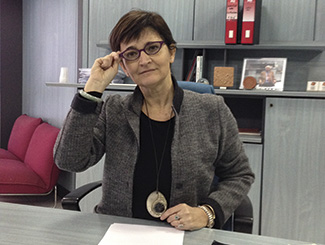 by Cesare Carbonieri02
Febbraio
2015
by Cesare Carbonieri02
Febbraio
2015
A new director for Centro Ceramico
New director Maria Chiara Bignozzi succeeds Giorgio Timellini, in office since 2006. Her mission: applied research in cooperation with companies.
2015 starts with innovations for Centro Ceramico. Giorgio Timellini, former director for several years, has been succeeded by Maria Chiara Bignozzi, Associate Professor of Materials Science and Technology at the School of Engineering and Architecture of Bologna University. Many are the issues she is to face. The consortium she is now heading is working full time with companies in constant search for concrete solutions and cutting-edge technologies.
Mrs Bignozzi, your task doesn’t look a simple one, given the evolution the industry is currently undergoing.
“I take this new task as enriching and challenging. The ceramic industry is undergoing significant changes especially as far as offer is concerned: ceramics is today a product of design not only for floor and wall tiling but also for furniture and innovative project solutions. The high level of technicity reached has opened the way for the broad use of ceramics in architecture. The Centro Ceramico is willing to provide a further and important consulting service”.
This is quite an essential trait in your mission.
“Drawing on the unique combination of insight and expertise gathered in the Centro since it was opened in 1976, my efforts will mostly address applied research carried on in cooperation with companies. A quite significant commitment which will also follow the European Commission guidelines for a sustainable technological development, with products and processes contributing to recycle and reduce greenhouse gas emissions. There are many ongoing seminars for companies currently being taking place at our branch in Sassuolo. They offer an update on scientific research as well as on national and international legislation.”
In the name, we suppose, of continuous innovation.
“Definitely. Consider that materials will need to be more efficient and sustainable than they were in the past, as far as processes and products are involved.”
Where will your investments be devoted to in the short- medium- term?
“To human resources first. Then to the updating of technical and scientific equipment. The cooperation with the University of Bologna and in particular with the Civil, Chemical, Environmental, and Materials Engineering Department makes our Centre a strategic partner for the development of cross-sectoral researches.”
Since its establishment, the Centre has been a reference point for companies: is it still so?
“Absolutely. Our power and strenght stem from our strong territorial roots. Our headquarters in Bologna and Sassuolo, which is right in the heart of the cermic district, have enabled us to work closely with businesses, carry on tests and analysis according to the most important product certifications, and guarantee prompt qualified assistance.”
Given the ever-increasing speed at which technology advances training must be one of the top priorities.
“It certainly is a priority. Centro Ceramico supports undergraduate and graduate training and orginizes tailor-made training courses for companies. The Centre calls for the importance of studying and getting acquainted with ceramics materials already in secondary school where the promotion of ceramics culture is particular important. Growth potential for the industry will also depend on how much young people know about environmental issues.”
Which are today an integral part of the usual business activity of ceramics operators.
“That’s why we focus on recycling of discarded materials, on the research for the improvement of energy efficiency in buildings, on surface functionalisation, on new low fire products. They’re all key environmental issues.”
The Centre’s stakeholders are the University of Bologna, Confindustria Ceramica, the National Union of Workers Producers’ Cooperatives and CNA – the Italian National Confederation for the Craft Sector and Small and Medium Enterprise. What is your opinion about their cooperation?
“I have a very positive opinion in regard to that question. The Consortium has always worked in harmony pursuing a unitary vision. The constructive approach of its components will be of great help along the road towards dynamic growth. And I myself hope to be able to contribute at my best.”